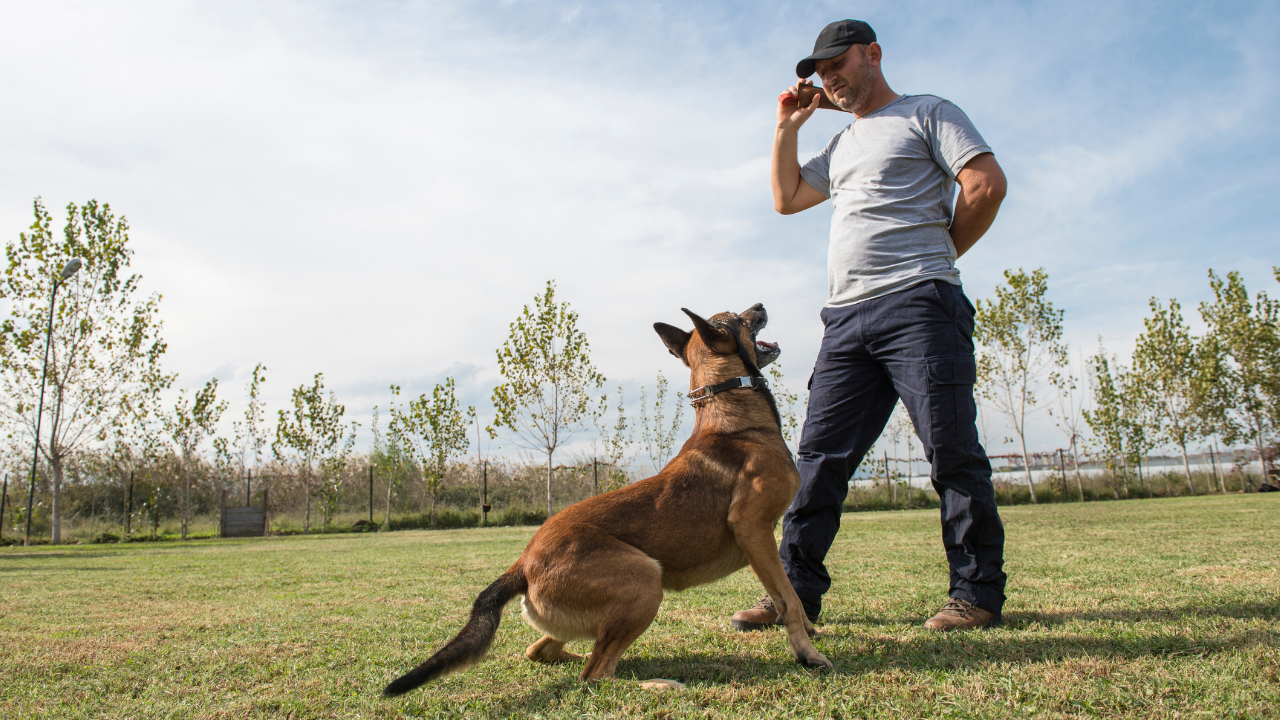Many people turn to dogs to protect their family and home, but is it a given that a dog will defend and protect their owner? How can you tell if your dog is an effective guard dog and if they will protect you or not? And is there some way to test how likely your dog is to protect you if attacked? Let’s get into it!
Will my dog protect me from an intruder?
Whether your dog will protect you depends mainly on two things: your dog’s genetics and your dog’s training.
An old saying goes, “if a dog is under pressure, it reaches into its ancestry for help.” This means that relatively few dogs naturally protect their owners if the genetics are not there.
In fact, the vast majority of dogs will not protect their owners from intruders. After all, most dogs have been selectively bred not to bite people, a trait called bite inhibition.
From this, you can see that most pet dogs may become frantic or afraid when there is an intruder.
They usually sound the alarm by barking. But very few dogs have the genetic instinct to truly attack a human. Even fewer have the training or conditioning to help them know how to do it.
Does this mean that no pet dog will protect their home and owner? No.
Some dogs are definitely special and defend their people and their homes with their lives, regardless of breeding or training.
Ultimately, factors such as the dog’s breed and their specific bloodline play the biggest role in their protective instinct and the likelihood of protecting you from an intruder.
Some dogs like the Caucasian Ovcharka and the Boerboel are natural perimeter guardians.
These dogs are genetically designed to defend their territory and home.
Livestock guardians like the Anatolian Shepherd also often make natural guard dogs who are protective.
However, the most reliable are close-quarter guardians like the Cane Corso or the Neapolitan Mastiff, who tend to be glued to their owners.
As impressive as these breeds are, there is a caveat: None of these breeds are ideal for inexperienced owners.
In fact, they can be dangerous with the wrong person. These are powerful dogs with a tendency towards hyperarousal (they can be triggered into an aggressive state very quickly).
Untrained dogs of these breeds can be dangerous.
So, what kind of dog will defend me from an intruder?
We have mentioned a few of the most natural guardians, such as close-quarter guard dogs, perimeter guardians, and livestock guarding breeds. And we have also touched on why getting one of these breeds can be a bad idea.
As these are independent and powerful dogs, they can be dangerous to humans.
For instance, a dog with too strong of a guarding instinct does not always know the difference between a child climbing into your yard to fetch a lost ball and an intruder.
So, these types of breeds are only recommended to highly responsible and experienced owners who can socialize and train them consistently.
But what about your traditional protection guard dogs? Won’t a German Shepherd or a Doberman Pinscher protect me?
Again, the answer is muddled.
True working protection dogs come from specialized working bloodlines. They undergo stringent testing and have been bred for generations to handle stress and pressure from a potential attacker.
As you can see, these puppies display fearlessness at an age that is too young to be taught.
Whether it’s loud noises, cracking whips, or bigger dogs, they do not flinch or recoil as most puppies would. This is the genetic blueprint they were born with.
But even within a breed like the German Shepherd, most dogs are not bred for this type of fearlessness.
Dogs that are not bred for temperament can develop extreme nervousness or hypersensitivity problems.
These dogs usually do not have the mental resilience to defend you in an attack.
Just like German Shepherds, many of the traditional guard dogs and protection dogs like the Doberman Pinscher and Bullmastiff have been bred as pets and show dogs for too long. Now they are no longer always ideal guard dogs.
This is why when considering a dog to protect you, it is vital to consider the bloodline.
Will a normal family pet dog protect you from an intruder?
It is unlikely that a family dog that has not been trained specifically in guard work will protect you from an intruder. They will bark, growl, or may even have their fur raised, but biting is unlikely.
This, however, is again dependent upon breed and bloodline. A German Shepherd or Doberman Pinscher has a higher chance of defending against a break-in or a mugger on your walk.
If you have a Havanese though, don’t expect them to jump in and save the day!
If you have a Border Collie, you may want to read Border Collie Resource Guarding: (Possessive Growling)
It’s in the bloodlines
Professional, reputable trainers tend to specialize in protection dogs. In other words, a trainer might focus on bloodlines that have proven success as working dogs.
On the other hand, a breeder might select bloodlines that boast successful show dogs, while neglecting aspects like working ability.
Then there are backyard breeders. These are usually breeders simply breeding two dogs together, usually without screening for health or temperament.
Aside from the many potential genetic defects that backyard breeders don’t consider, these dogs can be more unpredictable. Therefore, it’s a dangerous gamble looking for a guard dog here.
Not every pup has what it takes to be a guard dog, either. Even from reputable breeders.
Remember, some breeders select bloodlines that produce successful show dogs. These dogs are generally healthy, purebred animals with minimal chance of suffering hidden defects.
The best protection dogs are screened as puppies even with the right breeding. They can go through months, if not years, of training to become reliable protection dogs.
The aptitude test
We mentioned that most trainers do tests to estimate how good a guard dog a puppy will be. These tests can be conducted when the puppy is only six weeks old. That is the same age a pup is almost ready to leave their mother and join their new family.
A confident breeder is a transparent breeder, and they should be open to having pups tested.
That way, you can make a more informed decision and improve the chances of getting a good guard dog.
Professional training
We live in a time where one can learn to do just about anything by watching a YouTube video. That works for the perfect boiled egg or decorative wood carving. But unfortunately, it does not work for advanced protection dog training.
Real protection dogs are high-drive dogs, meaning they are strongly motivated to work.
It takes a lot of effort to channel this drive into a well-behaved and reliable guard dog. If they are allowed to get bored or lack exercise, you can say goodbye to your furniture. These dogs are notoriously destructive if they lack stimulation.
If you want a decent guard dog, you need professional training services.
In some cases, training programs will require your pup to stay at a training facility. That goes to show just how intense these training programs can be.

Will my dog protect me from other dogs?
Your dog probably will try to protect you from other dogs. The surprising truth is that dogs are unlikely to protect you from another human. However, they usually protect their owner from other animals, including dogs. They do this eagerly in some cases, especially if they are a breed that is naturally dog aggressive.
The tricky thing is understanding your dog’s motivation. For example, it might look like your dog is protecting you from a threatening dog. But how can you know if they aren’t engaging in some territorial dispute or fighting over dominance?
Does your Bullmastiff really believe that the Bichon Frise in that lady’s purse poses a mortal threat to you? Who is to say for certain?
Nevertheless, most dogs will try to protect their owners from other dogs unless they are fearful of other dogs themselves.
Keep in mind, a smaller dog or a physically challenged dog may not be able to protect you from other dogs even if they want to.
Have you seen our new must-read post, How Come Dogs Don’t Live Long?
Which dog breeds protect their owners?
It’s a difficult question to ask, and you should probably rethink getting a breed of dog just for its guarding instinct.
That said, some breeds are more inclined to protect their owner, but it can never be said for certain that they will.
Every dog is an individual and how they respond to an attack will depend on their nature, genetics, and training.
Some breeds that are known for their protective instincts include:
● Rottweiler
● Rhodesian Ridgeback
● Belgian Malinois
● Great Pyrenees
● Dogo Argentino
● Akita Inu
● Dogue de Bordeaux
● Komondor
● Black Russian Terrier
● Giant Schnauzer
Final Word
Your dog might protect you from an intruder, but the chances are that they won’t. They probably will protect you from another dog, but their motives might not have much to do with your safety.
If you want a dog for this specific reason, you need to start by choosing a puppy with the right traits. That is something professional trainers can help you do.
Naturally, there is more to it, and you need to take a lot of factors into consideration. For example, one should avoid breeds that require a highly experienced hand if you are not sure about it.
Once you have your pup, they need extensive training. Finally, you must have realistic expectations and remember that even a trained guard dog is still a pet and should never be a weapon.
For everything you will ever need to know about Rottweilers, we have our new site, www.a-love-of-rottweilers.com so be sure to visit!




